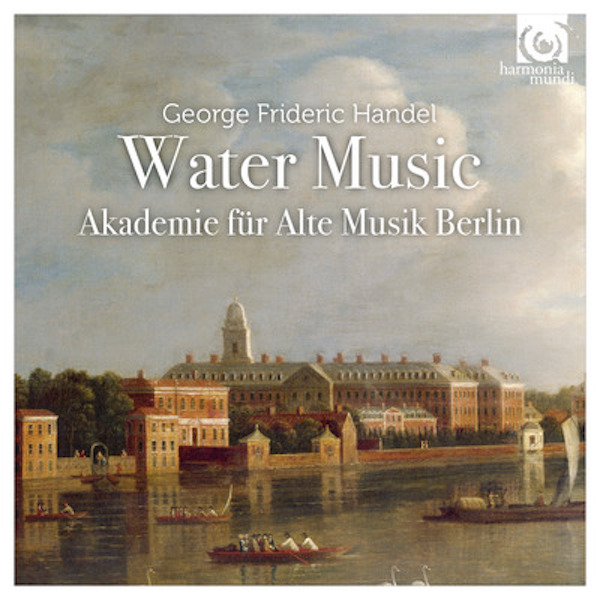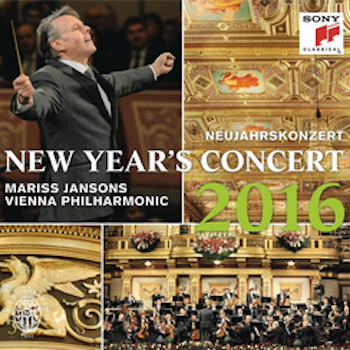Classical CD Reviews: Handel’s Water Music and the Vienna Philharmonic’s 2016 New Year’s Concert
Nobody, these days, plays the music of the Strauss family better than the Vienna Philharmonic Orchestra.

by Jonathan Blumhofer
In their recent recordings of pillars of the Baroque era, the Akademie für Alte Musik, Berlin (AAMB) has been on something of a roll: their 2013 account of Bach’s St. Matthew Passion with Rene Jacobs was a critical triumph and now comes a lithe, lively rendering of Handel’s complete Water Music. If the Freiburg Barockorchester’s 2014 recording of the six Brandenburg Concertos is taken into account (all of these recordings, coincidentally, from Harmonia mundi), one can make the case that we have experienced an impressive few years of period performance practice from Germany on disc.
The Water Music was, of course, written for the entertainment of George I while he was sailing from London to Chelsea and back in 1717; the King enjoyed it so thoroughly that it was repeated at least three times during the journey. It’s big-sounding music, not a little bit brash (thanks to the instruments suitable for outdoor performance that Handel included in its scoring), and often quite lively. Though none of the movements of its four suites have anything actually to do with water, there is, in the best performances of the work, an inexorable sense of flowing momentum to the whole.
And the AAMB’s reading is nothing if not that, both in terms of the tempos chosen and the ensemble’s approach to the suites’ many phrasings. Take, for instance, the third and fourth movements of the first Suite in F major. Both are thematically related (the second half of the latter reprises the whole of the former) but the opening of the fourth offers new material at a slower tempo. In this performance, the differing tempos offer a noticeable contrast, to be sure, but both Allegro and Andante sections offer pulses of identical purpose: driving forward and dancing with determined focus. It all results in a sweeping, charming performance that carries through the disc.
It’s a treat to hear the well-known excerpts – the Air and Bouree of the Suite no. 1, the Hornpipe and Rigaudons of no. 2, and the Minuets of no. 3 – played in such a musically satisfying context. And it’s even more of a pleasure to be reminded just how inventive and brilliant (both in sonority and technique) Handel’s writing in these Suites is. In the latter regard, the AAMB’s attention to tonal details offers a welcome reminder of the importance of color and resonance in this repertoire: it’s not just reserved for the domain of music of the 19th century and later. What’s more, Handel’s excellence as a contrapuntist is ever-present in these performances, tireless and bounding with energy.
HM’s recorded sound provides a good balance between the strings and sometimes-braying brasses. Lovely, intriguing color combinations emerge (horns and bassoons at various junctures in the Suite no. 1 are a personal favorite) and the vitality of the ensemble’s sound never ebbs. On the contrary, everything here pops.
*****

Nobody, these days, plays the music of the Strauss family better than the Vienna Philharmonic Orchestra (VPO). And the ensemble’s annual New Year’s Day concert offers them the opportunity to strut their Straussian stuff to a global audience. Programs are reliably (some might say frustratingly) familiar: the collection of the complete works performed at these events totals just over three hundred pieces, a not unimpressive sum, though it’s less than a quarter of the 1200+ published compositions of Johann Sr., Johann Jr., Josef, and Eduard Strauss, and includes a decent-sized helping of scores by the likes of Franz von Suppé, Josef Lanner, Jacques Offenbach, Joseph Hellmesberger, Mozart, and a few others.
And, overall, this year’s installment (Sony Classical), the 75th, offers plenty of traditional favorites. Johann, Jr.’s Blue Danube and Emperor Waltzes are there, as are the Schatz-Walzer and the Overture to Eine Nacht in Venedig. The VPO tends to cycle through four or five of Josef’s seventy-plus waltzes; this year’s representative is Sphärenklänge. Die Libelle, another perennial favorite of Josef’s, is here, too. Eduard’s Mit Extrapost is one of a welcome number of schnell-polkas and galops this year and, of course, the whole shebang wraps up with the audience clapping along (obnoxiously on the downbeats) to Johann Sr.’s Radetzky-Marsch. As sometimes happens at these events, also, the Vienna Boys Choir joins the orchestra in choral arrangements of two pieces, Johann Jr.’s Sängerslust and Josef’s Auf Ferienreisen.
But, easy as it may be to criticize the inherent conservatism of the New Year’s Concert’s programming, at least the VPO seems aware of the fact that there’s a lot of music they haven’t yet played at these events and, year-to-year, they make some efforts to broaden the repertoire. The 2016 New Year’s Concert offers a very healthy eight New Year’s Concert premieres (out of twenty-one total pieces), and therein lies much of this disc’s interest.
Admittedly, some of them don’t succeed very well. Émile Waldteufel’s España, with its insistent repetitions and obsessive use of castanets, proves a shallow remix of Chabrier’s charming tone poem. And the Entr’acte from Act 3 of Johann Jr.’s Fürstin Ninetta is pretty and beautifully played, but, removed as it is from the context of the operetta, it doesn’t amount to much by itself.
Most of the others, though, have aged well. It’s an unadulterated pleasure to hear the VPO have at Carl Michael Ziehrer’s Weaner Mad’ln, touched as it is with the same strain of melancholic nostalgia that makes the best of these waltzes so deeply expressive. Josef Hellmesberger’s Ballszene may not offer much by way of depth but it’s certainly a charming moto perpetuo and you’re never going to hear it played better than it is here. Ditto Sängerslust and Eduard Strauss’s Außer Rand und Band. If Robert Stoltz’s UNO-Marsch, written for the United Nations in 1962, sounds a little too much like something by Eric Coates, at least it carries with it a certain swagger.
Presiding over the performance is Mariss Jansons, leading his third New Year’s Concert. As in his prior two (2006 and 2012), he draws out playing from the VPO that possesses great energy and color: there’s no sense of complacency in these performances, no matter how often the orchestra may have played these pieces before. In this (and the program he curates), he’s proven to be the most reliably fine leader of these concerts since at least Nikolaus Harnoncourt, if not Claudio Abbado and Carlos Kleiber.
Jonathan Blumhofer is a composer and violist who has been active in the greater Boston area since 2004. His music has received numerous awards and been performed by various ensembles, including the American Composers Orchestra, Kiev Philharmonic, Camerata Chicago, Xanthos Ensemble, and Juventas New Music Group. Since receiving his doctorate from Boston University in 2010, Jon has taught at Clark University, Worcester Polytechnic Institute, and online for the University of Phoenix, in addition to writing music criticism for the Worcester Telegram & Gazette.
